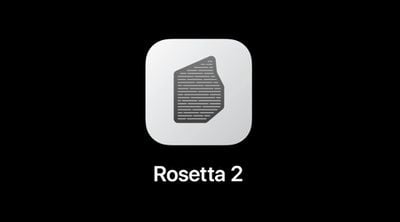Rosetta May Be Removed From M1 Macs in Some Regions on macOS 11.3
Installing the upcoming macOS 11.3 software update on an M1 Mac may result in Rosetta 2 being removed in one or more regions around the world.

In the third beta of macOS 11.3 seeded to developers for testing today, MacRumors contributor Steve Moser uncovered new strings in the beta's code indicating that "Rosetta will be removed upon installing this update." Another new string reads "Rosetta is no longer available in this region. Applications requiring Rosetta will no longer run."
Apple did not specify which regions where Rosetta 2 would be "no longer available," and no further details are known at this time.
Rosetta 2 enables Macs powered by Apple silicon like the M1 chip to run x86 apps built for an Intel-based Mac. The translation layer
works in the background when a user opens an app compiled only for Mac computers with an Intel processor, and automatically translates the app for use with Apple silicon the first time the app is run.
It's unclear why macOS 11.3 might remove Rosetta 2 on M1 Macs in some regions, but perhaps there are legal or copyright reasons involved. Apple did not immediately respond to our request for comment, but we'll provide an update if we hear back.
The third beta of macOS 11.3 also adds some new settings with imagery for mapping game controller buttons to keyboard layouts, according to Moser's code-level findings, but we are not fully sure what this entails.
Popular Stories
If you have been experiencing issues with wireless CarPlay in your vehicle lately, it was likely due to a software bug that has now been fixed.
Apple released iOS 18.4.1 today, and the update's release notes say it "addresses a rare issue that prevents wireless CarPlay connection in certain vehicles."
If wireless CarPlay was acting up for you, updating your iPhone to iOS 18.4.1 should...
Apple is preparing a "bold" new iPhone Pro model for the iPhone's 20th anniversary in 2027, according to Bloomberg's Mark Gurman. As part of what's being described as a "major shake-up," Apple is said to be developing a design that makes more extensive use of glass – and this could point directly to the display itself.
Here's the case for Apple releasing a truly all-screen iPhone with no...
The first iOS 19 beta is less than two months away, and there are already a handful of new features that are expected with the update.
Apple should release the first iOS 19 beta to developers immediately following the WWDC 2025 keynote, which is scheduled for Monday, June 9. Following beta testing, the update should be released to the general public in September.
Below, we recap the key...
While the iPhone 17 Pro and iPhone 17 Pro Max are not expected to launch until September, there are already plenty of rumors about the devices.
Subscribe to the MacRumors YouTube channel for more videos.
Below, we recap key changes rumored for the iPhone 17 Pro models as of April 2025:
Aluminum frame: iPhone 17 Pro models are rumored to have an aluminum frame, whereas the iPhone 15 Pro and ...
Apple's iPhone development roadmap runs several years into the future and the company is continually working with suppliers on several successive iPhone models simultaneously, which is why we often get rumored features months ahead of launch. The iPhone 17 series is no different, and we already have a good idea of what to expect from Apple's 2025 smartphone lineup.
If you skipped the iPhone...
Despite being more than two years old, Apple's AirPods Pro 2 still dominate the premium wireless‑earbud space, thanks to a potent mix of top‑tier audio, class‑leading noise cancellation, and Apple's habit of delivering major new features through software updates. With AirPods Pro 3 widely expected to arrive in 2025, prospective buyers now face a familiar dilemma: snap up the proven...
Apple today released iOS 18.4.1 and iPadOS 18.4.1, minor updates to the iOS 18 and iPadOS 18 operating systems that came out last September. iOS 18.4.1 and iPadOS 18.4.1 come two weeks after the launch of iOS 18.4 and iPadOS 18.4.
The new software can be downloaded on eligible iPhones and iPads over-the-air by going to Settings > General > Software Update.
There have been complaints about ...
Apple today released tvOS 18.4.1, a minor update to the tvOS 18 operating system that came out last September. tvOS 18.4.1 comes two weeks after Apple released tvOS 18.4, and it is available for the Apple TV 4K and Apple TV HD models.
tvOS 18.4.1 can be downloaded using the Settings app on the Apple TV. Open up Settings and go to System > Software Update to get the new software....
Apple has quite a few security features that it's added to iPhones, iPads, and Macs over the years. Now more than ever, it's important to make sure you're taking advantage of the built-in security tools that are available to keep yourself and your data safe, so we've rounded up a list of the most important options.
If you don't already have these enabled, you might want to consider turning...
























